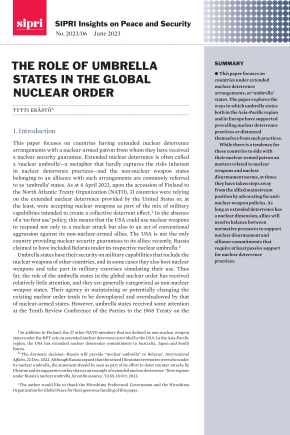The Role of Umbrella States in the Global Nuclear Order
This paper focuses on countries under extended nuclear deterrence arrangements, or ‘umbrella’ states. The paper explores the ways in which umbrella states both in the Asia-Pacific region and in Europe have supported prevailing nuclear deterrence practices or distanced themselves from such practices.
While there is a tendency for these countries to side with their nuclear-armed patron on matters related to nuclear weapons and nuclear disarmament norms, at times they have taken steps away from the allied mainstream position by advocating for anti-nuclear weapon policies. As long as extended deterrence has a nuclear dimension, allies will need to balance between normative pressures to support nuclear disarmament and alliance commitments that require at least passive support for nuclear deterrence practices.
I. Introduction
II. Endorsing nuclear deterrence through policy and practice
III. Stepping back from nuclear deterrence policies
IV. Conclusions

